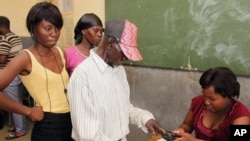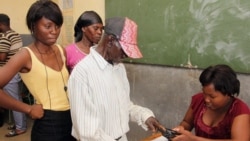The citizens of Namibia voted November 28 in Africa’s first electronic election, an example for other nations for commitment to the democratic process.
Nine candidates campaigned to succeed President Hifikepunye Pohamba, who is stepping down after serving the maximum two terms set in the southern African nation’s constitution. It was Namibia's fourth elections since independence in 1990, and though the new voting procedures produced problems at some polling stations with the newly introduced electronic voting machines and handheld scanners to verify voter cards and fingerprints of voters, a regional observer group said the elections were free and fair.
The head of the Namibian Electoral Commission said that by moving into the electronic voting age, his country will produce faster election results and save money doing so. Instead of spending 20 million Namibian dollars to print paper ballots for distribution around the country, the commission spent just 2 million Namibian dollars for printed materials.
The United States congratulates the people of Namibia for exercising their democratic right to vote on November 28. The nation has once again demonstrated its commitment to an open electoral process and respect for presidential term limits. We applaud the active participation of the country’s political parties, civil society and citizens in shaping an inclusive discussion throughout the campaign. The extraordinary participation among first-time voters and women candidates reflects the progress that Namibia has made and the commitment of the Namibian people to a democratic future.
The United States and Namibia share a strong partnership. We work together to strengthen health care systems, counter threats to Namibia’s unique ecosystems, promote peace and security in the region, and protect human rights for all of Namibia’s citizens, particularly the most vulnerable in society.
The United States looks forward to continuing our partnership with the new Namibian Government and the people of Namibia in support of Namibia’s development and the welfare of its people.

















